
Since mobile devices have already taken over the market, it is now easier for us to remain connected with the digital world on the go. The linking medium being- ‘Mobile Apps’ or ‘Mobile Applications’, are not new concepts—we encounter them daily on our mobile devices.
Most of the time, apps are why we look at our phones. You may be scrolling through social media posts or receiving a notification from a food app, a reminder to pay your bills, or even a notification to take your medicine. Apps surround us, and we have developed a huge dependency on them. Some apps we use often, and some we use occasionally. There’s even a high probability you are reading this on your tablet or smartphone right now!
Yet, surrounded by so many apps, have you ever considered how mobile apps help businesses? How do they help them generate revenue, and what is the overall purpose of choosing mobile apps for business? Below are some areas in which mobile apps in business help-
With such a vast and tight market, it becomes challenging for businesses to remain competitive with a reliable app that adds value to the customers. In this blog, we have discussed the various benefits of mobile apps for business and how you can increase your digital presence in the market, ultimately driving increased revenue and brand identity. We will also demystify the art behind gaining unparalleled business ROIs through apps.
Mobile apps in business have opened an enormous opportunity for marketers to increase their brand visibility and provide customers with a direct communication channel. As statistics suggest, 85% of consumers prefer purchasing through mobile apps over mobile websites. And nearly 57% of digital media consumption is made via mobile apps. This is just the beginning; as we advance in the digital era, more and more apps will enter the market.
Google emphasizes mobile-first content as mobile device usage becomes widespread, and approximately 50% of web traffic comes from them. Some of the key benefits of mobile apps in business are as follows:
Mobile apps are a new way of generating sales and monetizing various products and services. They provide direct access to consumers, allowing businesses to present products and services in the most convenient way possible. Apps can significantly increase conversion rates and order values with options like one-click buying and suggested products.
As apps become the most powerful tool for customer interaction, it becomes easy for businesses to engage with their customers on a deeper level. Features such as push notifications, in-app messages, and targeted content help businesses reach their app users daily and, thus, build loyalty.
As the market becomes more mobile-centric, a business that develops a good app will be cut above the rest. This reflects the company’s focus is on developing new ideas and meeting customers' needs, which can be critical in the case of a competitor’s product or services.
Learn the Secrets to Boosting Revenue and Engagement with a Mobile App!

Small and medium entrepreneurs face harsh challenges as they enter the market while competing with the big sharks. Their lack of knowledge about the cost of building apps and the absence of skilled labor and expertise become their most significant hindrance factors. But, when done correctly, developing a mobile app is an excellent opportunity for SMBs and brings them to the same parity as their competitors. Sometimes, it even gives them competitive advantages against their more extensive and less flexible counterparts.
Let’s understand this with an example- “Instagram”.
The app was initially built as a website for photo-sharing and started by just a handful of employees. Soon after, they launched their mobile apps, which helped them gain popularity. It soon became the most popular social media company on the planet. The case of Instagram depicts how mobile apps help businesses reach glory.
These essential factors helped Instagram to chomp its way to the top and can be/should be practiced by businesses.
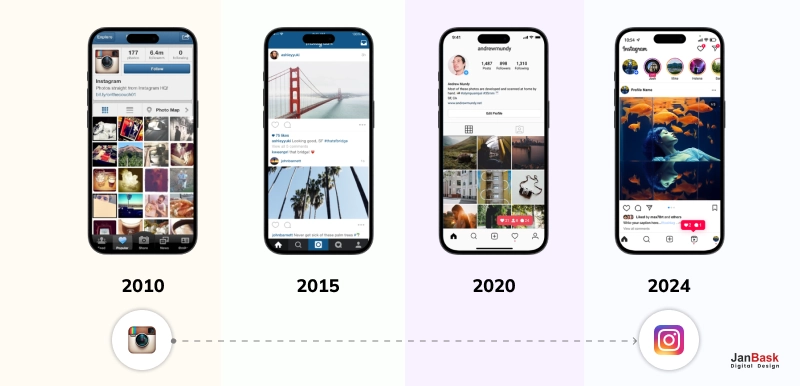

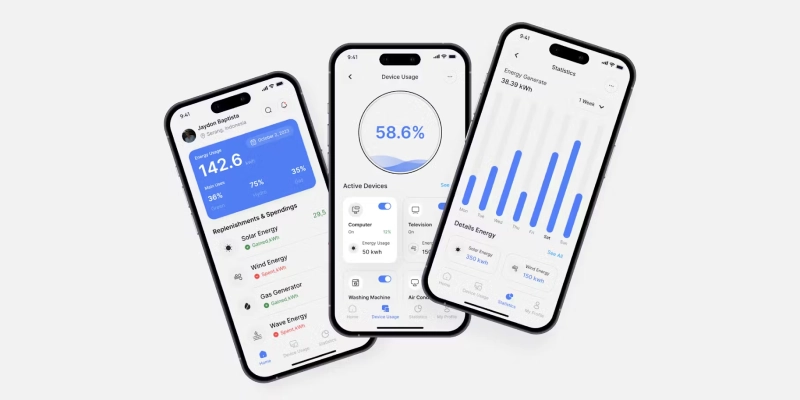
It's more than the app; it's up to the shift in consumer behavior. Mobile devices are now a liability in our lives, more than just an asset. We turn to our mobile devices for every other query, whether on a smartphone or tablet. This drift in behavior has opened a vast market space for apps to flourish.
Below are the significant factors you can achieve with mobile apps for your business.
An app on the user’s device screen also becomes a constant advertising postfix for brand recognition or recall. This constant communication becomes the source of reliable marketing over conventional commercialization.
Apps offer a one-on-one communication channel through which you can convey personalized messages and alerts without using any third-party app. It also eliminates the fight for the customer’s attention in their inboxes.
Apps can use data analysis to formulate recommendations exclusive to particular customers based on their past activities on the app. For example, Uber Eats offers customers the option to re-order the food items they once ordered and even suggests restaurants based on their previous selections. This enables customers to complete an order in less time and, of course, adds revenue to the app's business. Besides, it is not only limited to recommendations; businesses can also send personalized messages and loyalty rewards to their customers.
Any business that is into marketing needs to collect user data to understand its customers better and, accordingly, plan its next marketing move. Apps help by becoming a communication medium and thus collecting valuable data as insights into customer wants and needs. With this data in hand, satisfying customers' liking and helping in better brand engagement becomes more manageable.
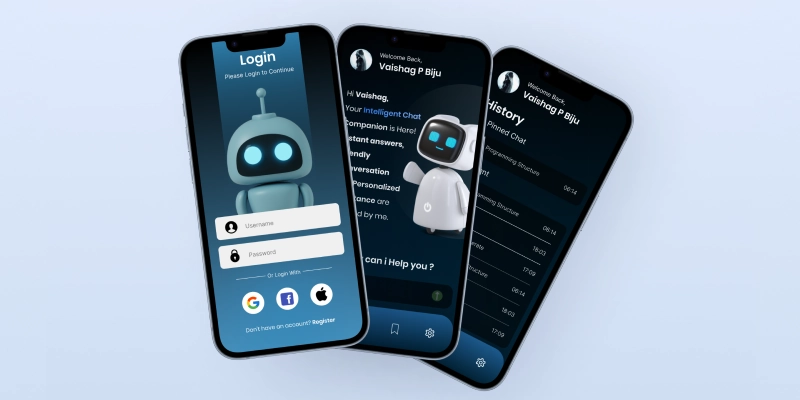
Mobile apps in business have given app owners a significant opportunity to provide even better customer service and support to their customers. The app can be configured with AI chatbots so that even during off hours, customers can get general help related to their problems 24/7. Besides this, AI chatbots can help cut the cost of establishing a customer support team. Feedback and reviews collected from customers via the app can be smartly used to improve services and solve customer concerns.
Your business app will definitely be a key factor in differentiating your business from those who still lack one or have a lousy app presence. A well-designed mobile app informs the consumers that your business is up-to-date, consumer-oriented, and ready to offer the highest level of service.
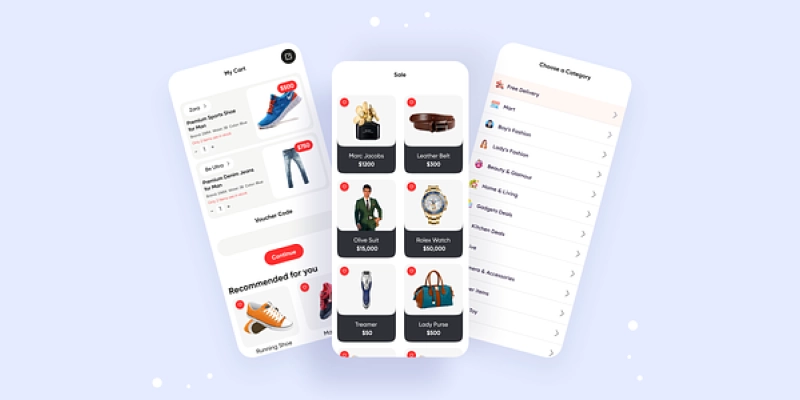
Mobile apps are valuable beyond providing value to customers and collecting user data. The main benefit of mobile apps for businesses is that they will eventually become a source of revenue generation for the business. Here are some strategies that can be used to develop strong revenue growth for the business:
This approach is best for mobile applications that offer free services. Businesses can offer their fundamental services for free and apply charges for the range of their premium services. For instance, a fitness app could provide the user with basic exercise training for free, but to get hands-on with advanced exercises, training routines, or diet plans, one has to pay a certain fee.
Applications can charge for their services directly by providing ongoing value to users in exchange for recurring payments. This revenue generation model is especially beneficial for apps that provide content-based services like Netflix or Spotify. However, Netflix only allows its users to access content once they have subscribed to their services, and in the case of Spotify, members can listen to the songs once they download the app. But without a subscription, you will have to listen to the same irritating ads often, indirectly promoting users to subscribe to their services.
This aspect of apps is immensely useful for organizations that sell tangible products or digital assets. Apps can make buying easier and quicker for customers with features like one-click buying and saved payment details. The integration of e-commerce in apps has also impacted the sales process, thus increasing conversion rates.
Every business out there is looking for channels to advertise their services or products to customers. Advertising requires capital, and companies are looking for spaces to advertise. If you have an app, you can reach out to these companies and sign contracts to advertise their services in your app. For which you will get money. It’s a win-win situation for you. But while putting ads, you should be careful as you should not belittle your app performance for your users in the process. The ads should take only a dedicated space in your app and should not overcrowd the content of your app, or else it will result in a poor UI/UX experience.
How about an app that is open to both free and paid users? It’s an exciting concept. Some famous apps, like YouTube and Spotify, follow this model of approach for their business. Their platforms are open for every user, the only difference being that the customers who pay for the services receive uninterrupted access to the content. And free users will have to bear with the ads. This dual nature of its services is open to all, and hence, it is able to maintain a strong user base while enjoying a constant source of revenue from its privileged customer base.
Some Free Tips to Increase Sales and Customer Lifetime Value Through Mobile Apps in Business:
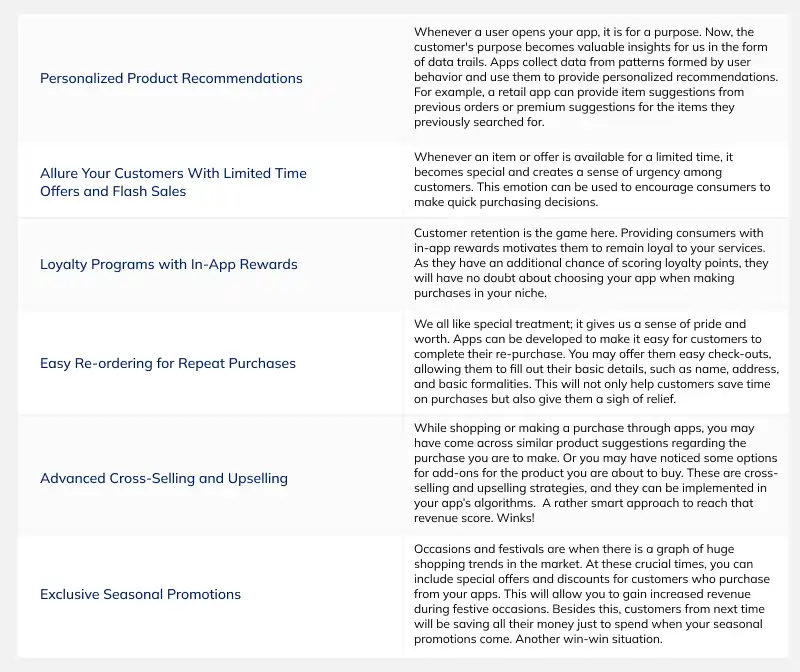
The above-discussed recommendations are important for your mobile apps in business to bring in constant revenue. Just remember that your mobile app is there to make customers' shopping journeys a pleasurable experience. This will automatically bring in leads. Stick to the basics and implement a fine ASO strategy
Customer engagement and loyalty are the most crucial of the many benefits of mobile apps for businesses. Launching a mobile app for your business gives you a solid chance to guide your success on the right path. It opens up a channel for you to reflect on your brand, service, or product and show how it facilitates consumers. Just include the following, and success is yours:
This facility provided by mobile apps enables them to send timely notifications to users. App owners or the team can decide the time notifications are delivered to customers and accordingly customize them to match the intent of sending them all. For example, a food app can send notifications anytime with an exclusive offer or just remind them to eat. A retail app can notify its users to inform them about the ongoing special offer. You have to keep a balance; that is, you should ensure that the frequency of receiving notifications from the customer’s side doesn’t get irritating, as it may lead to app deletions, too. So, do it, but don’t overdo it.
You can interact with your customers while they are using your app. In-app messaging can be used during customer onboarding, to announce a new feature, or even to make personalized offers. These short interactions with customers will give them the impression that the app is regularly updated and is not dormant.
No industry app has seen a boost in downloads as game apps have in the past few years. The app downloads in the gaming sector are much higher than in any other industry. Then why not use this to your app's advantage? You can introduce a section in your app gallery dedicated to game playing. You can encourage the customers to play short games on your app or participate in tournaments organized via your app. You can offer them win points that can be redeemed at the time of checkout. This will help improve customer engagement rates and customer retention.
Sometimes, customers wish to get suggestions from friends while shopping online or just be informed about their new purchases. To do this, they can take screenshots of the purchase and forward them through sharing channels. But this will be a long process. Why not make it possible for them to share their wish list directly through your app? This will help you build a community around your brand and app services.
Everyone likes special treatment. What if you could make each of your customers feel special? No one or nothing can take away that loyalty. Personalization can be done by monitoring and analyzing each customer's behavior. For example, a retail app can suggest a monthly list for a customer based on their past purchases, or a music app can send a customized playlist to a person based on their listening preferences.
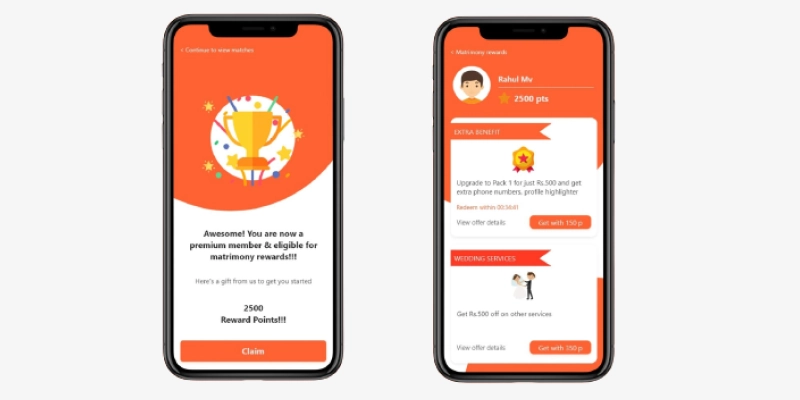
Nothing is final! Change is intermittent. The same goes for your app. Updates are a mandatory part of your app business strategy. Launch regular updates of your app, always aiming for customer satisfaction and improving their app experience by fixing bugs and introducing new features.
If you are in the mobile app business, tracking the results generated from your customer-app interactions becomes crucial. It tells you if the strategies implemented are working as intended or not. Below is a detailed view of the factors that should be considered while tracking metrics:
The whole purpose behind creating an app and developing its UI/UX experience is to increase customer engagement and, in return, generate greater revenue profits. Monitoring customer engagement metrics will allow you to improve the tactics being used and yield desired results.
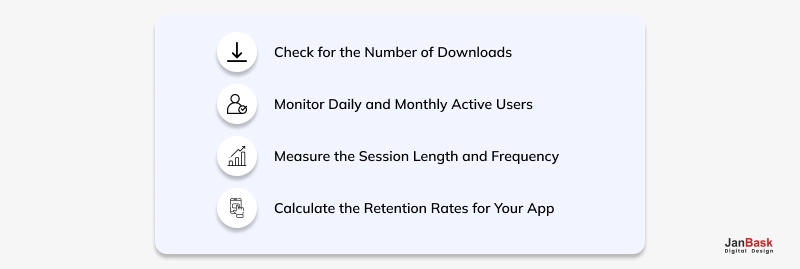
The real success of the app depends on the revenue it generates. Furthermore, keeping a check on these metrics will help you formulate better strategies for future endeavors with customers.

The important aspect of having mobile apps in business relates to how much the app contributes to enhancing your brand presence in the market niche and among customers.

By following the above-mentioned strategies, you can keep a keen eye on their effectiveness and implement new ones accordingly to increase the impact of your app.
Starbucks has effectively applied mobile applications to enhance customer loyalty and participation. The Key features they included are as follows:
By providing customers with the above mobile app features, Starbucks has always remained a dominating leader in its niche. These features can be the next turning point for your mobile apps in business.
Now, let’s take another case study of the famous brand Zara. This will provide insight into the common challenges faced by a business and how mobile apps can help overcome them.
The challenge: Zara wanted to increase its reach in the online market and reduce its purchase return rates.
The solution: Zara invested resources in developing an AR app for its business. This app’s main cutting-edge feature was its Augmented Reality feature, which allowed its customers to have a virtual experience with their apparel choices and more. The customers could now try on those beautiful dresses virtually and were more positive before purchasing.
The Outcome: Zara was able to bridge the gap between its offline store business and the online market by selling through the mobile app. Moreover, they were able to reduce their return rates and increase revenue. A win-win accomplishment for Zara.

Obtaining maximum benefits from your mobile apps is easy if you focus your app practices on the user experience. You can try implementing whatever strategies you like, but if your app is not customer-centric, it is doomed to fail. Here are some approaches you should opt to keep your app customer-focused:
You must be wondering why Zeroth Law exists. It exists because its value is above all other factors to be considered while building a mobile app for business. You can compensate with anything, but not the trust of the many users using your app services. Make sure that your app is under the data protection regulations accepted by GDPR and CCPA.
To protect sensitive information, use encryption and strong authentication and update the application to fix security flaws. And, of course, remember to explain to your users how to be safe as well.
So, it goes without saying that security is not an option but a special guarantee given to users in the sphere of mobile apps. Stick to your word, and you will have the trust, loyalty, and good name of a company that keeps its word.
You can control the prices of building apps according to your preferences, as many factors are involved. Excluding or including them will give a final figure. On an estimate, a simple app can be developed at a cost between $10k and $100k, while a more complicated app loaded with advanced features can cost more than $100k.
The development of an app requires many stages to build. In JanBask Digital Design, we follow a simple process to build an app, which includes-
The time required for an app depends on the complexity of the features to be included in it. Simple apps usually take 2 to 3 months, while complex projects may take up to 6 months or longer.
Yes, and you should. Regular app updates ensure that an app is free from bugs and has the latest features. Many apps follow this practice of releasing updates occasionally and addressing app issues.
There are many practical ways of marketing your app to the target audience, some of which are:
There are many ways to obtain revenue from your app-
Mobile apps have become essential for business success, as they give customers a personalized approach to your app services. Some of the advantages of having a mobile include increasing the company’s exposure, interacting with customers, and creating new sources of income. With an ideal app and given strategies, you can get the app you have always wanted for your business growth.
JanBask Digital Design provides Mobile app development services centered on the customer’s needs as you develop applications for your business. Of course, we know how mobile apps contribute to business income through push notifications, in-app purchases, and well-illuminated ASO strategies. Partner with us today and create business applications leading to new growth avenues and high app earnings and traffic.
Interested in our Mobile App Development Services?

S
I read an article on your website and I am very impressed by your blog.